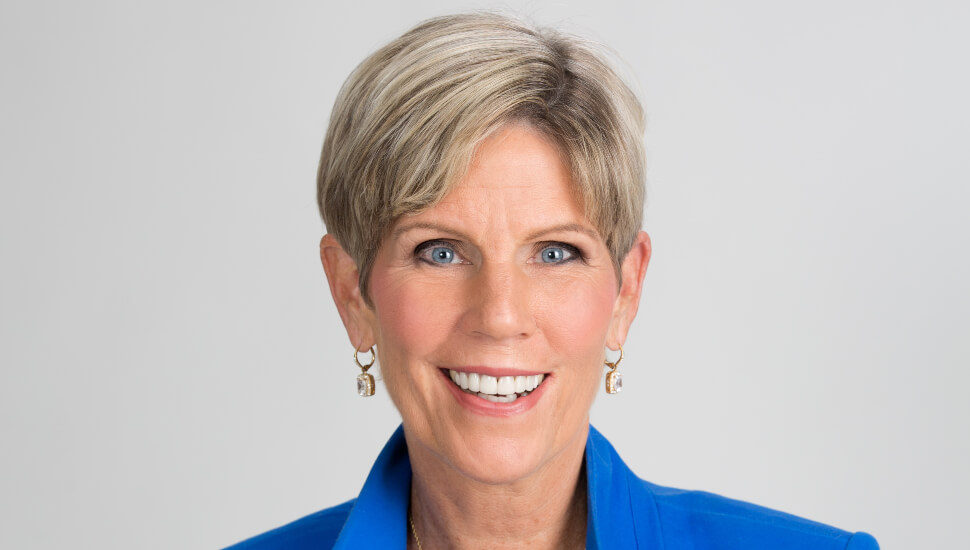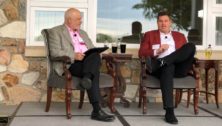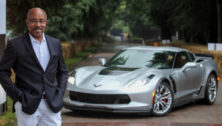Chester County Leadership: Patti Brennan, President and CEO of Key Financial


Patti Brennan, the President and CEO of Key Financial, spoke with VISTA Today about growing up in a family with seven children, including one who was a two-time bronze medalist in the Olympics, all of whom were separated by just eight years; her disinterest in diving, a sport that her father and siblings excelled in; and being cut from the lacrosse team in middle school, only to make the team in high school and rewrite the record books in college at Georgetown University.
Brennan also discussed what sparked her future career as a financial planner; inheriting her mother’s enthusiasm, her father’s sense of logic, and both of their self-motivation; starting her own firm; what has changed in her industry throughout the years; and the opportunities she’s focused on in the second half of 2021.
Where were you born, and where did you grow up, Patti?
I was born the fifth of seven children in Ambler and moved to Newtown Square when I was in Fourth grade.
What did your parents do?
My dad was an account executive for IBM, and Mom was a stay-at-home mom.
It wasn’t until a few years ago that I realized that while my dad had a good job, money was really tight. With 7 kids 8 years apart, they couldn’t save for colleges or for retirement and when my parents fought, it was always about money. If there’s one thing that makes children feel insecure or worried, it’s to hear their parents fight about money.
Fast forward, and here I am – a financial planner. Someone once said our life experiences from the age of eight to the age of thirteen will ultimately shape our lives and determine our path. Any wonder that I am a Certified financial Planner?
What memories do you have of growing up in Newtown Square?
In my family, I was fifth in the order. There was the older group and the younger group of kids. I was the oldest of the younger kids and sort of got lost in the shuffle. My sister is a two-time Olympic diver. My dad was on the University of Penn diving team and almost made the Olympics. My brother was also a great diver. My other siblings were always on a three-meter or ten-meter diving board doing flips, winning ribbons and 1st place medals…but I just didn’t seem to inherit that talent.
Why weren’t you a good diver?
Diving did nothing for me; I just didn’t like it. My sister is a diving coach now. I appreciate her approach because it’s not about the mechanics of diving; it’s about teaching the kids to overcome their fears.
What did you do to stand out in your family of overachievers?
I went to Ithan Elementary, Radnor Middle School, and Radnor High School, and worked just a little bit harder to excel in school. In my family, that was an outlier!
Did you play sports?
Since diving into freezing cold pool water was not going to be part of my destiny, I went out for lacrosse in middle school, Unfortunately, I didn’t make the team, but was in gym class one day learning about lacrosse, and the gym teacher asked me why I didn’t go out for the team. When I told her I didn’t get picked, she suggested I go to practice that day and the rest of the season. I didn’t get to play in any games, I figured I could work to make the “real players” better. The next season, I made the team and continued to play in high school, and in college. What a terrific experience it was to fail, then end up Captain of Georgetown’s team, setting several records that stood for sixteen years.
Not many people knew about lacrosse back then.
You are right, although it was getting quite popular. To me, the actual sport isn’t really what matters, it’s what the experience teaches us. We all learn the importance of teamwork, culture, and setting goals. For example, when I was a junior in college, I had a goal in my mind to score thirty goals in eight games, which is a lot. I didn’t tell anyone about my plan. At that time, there were no boundaries on the field, so I knew I had to have stamina, so I swam 100 laps without stopping in the morning to increase my endurance and then went to practice at night.
Here’s where some irony comes in: my parents were so busy on the diving meet tour because there was no school support system- it was all on them – and were not able to come to my lacrosse games. It was not because I wasn’t important to them, and I totally got the fact they were all over the map with the other kids. Our eighth game was at Maryland that season, and it was the game I scored my thirtieth goal for the season, and my parents were there to see it. I think that was just one experience that kind of locked things into place subconsciously for me.
What kind of music were you listening to back then, Patti?
Back then, I was a real nerd, and music wasn’t really my thing. I was a Donny Osmond nerd.
What jobs did you have growing up?
I was not one of those kids who was working three jobs to buy bread for the family – far from it! It was easy for me to get babysitting jobs because the kids always asked for me. I liked to have fun, and we always did activities rather than just sit and watch TV. I was really engaged with the kids, so the parents always wanted me back.
Where does your energy and drive come from?
I suspect I got some of my mother’s enthusiasm. My mom was always an enthusiastic person, and she was the master of delegation. People always ask, “how in the world did your mom raise seven kids?” Here’s the truth: she never lifted a finger! That woman would sit on the couch and tell us kids what to do, holding us accountable every step of the way. I learned what delegation really means from my Mom.
What did you pick up from your father?
My dad was very logical. He would get ruffled but always able to zero in on what he wanted.
One of my favorite memories is one time when I came home from college after I had been chosen captain of the lacrosse team. My father hung a sign across the door that said, “Welcome Home, Captain.” I didn’t even know he knew!
The thing I’m most grateful for is that my parents taught me to be self-motivated. That drive I have comes from within. The sign my dad put up was the cherry on top, after the outcome was known. That was not the driving force, yet, it felt so good to know he was proud of me.
Where did you go to college?
I went to Georgetown University in Washington, DC, to become a nurse. I took a class my senior year called Financial Planning. Georgetown students had to wait four years to get into this class because everyone loved the professor. I absolutely loved the class. Because it was my senior year, I figured it was too late for me to have a passion for finance, so I graduated and took my nursing boards, and became a nurse.
I started working at Lankenau Hospital in Lower Merion in Oncology before being promoted to ICU. I worked in the ICU for three years.
How did you make the transition from nursing to financial planning?
I had an interim experience in nursing that led me to this epiphany that I wanted to switch careers. I was in the ICU one night, and at the time, I worked from 11 PM to 7 AM shift, and I was talking to a resident who was complaining about doing his taxes. I did his tax return, and he got $3,000 back, which back then was like winning the lottery. The next thing I know, people in the unit were coming up to me asking how much I charge to do taxes!
Soon after that, there was an ad in the Philadelphia Inquirer for an account executive at a financial planning firm in Philadelphia. It was a Sunday morning, and I looked at my husband Ed and said, “if I could do it all over again, that’s what I would have done.” I was twenty-eight at the time.
Here’s the punch line; A month-and-a-half ago, we got a call from that same resident who said he’s been following my career all along and wanted to get together for a financial planning meeting! He’s coming in later today!
Who were the people who saw potential in you along the way, Patti?
My husband, Ed, is wonderful. In the mid-1970s and 1980s, when I started, women had traditional roles like nursing and teaching. Ed supported me as I embarked on this journey as a woman trying to enter a male-dominated industry. After eleven interviews and three personality tests, this firm hired me. Ed encouraged me at every step.
You eventually get hired as a financial planner. What did they see in you?
They hired two people because they didn’t think it was going to work out with me! I didn’t have an MBA or experience in the business. At the time, the firm was really at the forefront of legitimate financial planning.
Years later, I asked why they hired me. They told me it was because I had enthusiasm, had done my research and that I was interested in a holistic approach. They thought my nursing experience would be an asset.
What I really appreciated about this firm is that they hired me because they didn’t have to “unteach” me anything, and I didn’t have to “unlearn.” I was a clean slate.
Who else saw promise in you?
My kids. It was tough growing up with a mother like me.
How did you start your own firm?
I worked at that firm for five years, and then I was being recruited by a law firm and an accounting firm. I went to Roy Diliberto, the principal of the firm I worked for and told him I was being recruited by a law firm and accounting firm. At the time, I had a baby and a long commute to Philadelphia. There was a lot going on in my life. Roy told me that I shouldn’t work for anyone else and should start my own firm.
At the time, Roy’s firm was changing its business model, with a one million dollar minimum, focusing only on portfolio management. While they have since changed back, I was a former nurse and had just gotten my CFP, and holistic financial planning was what I liked.
Roy suggested I start my own firm in West Chester and offered to be my back office. He basically found a win-win solution for me. I didn’t have the capital, the income, or the backup to start my own firm. I shared a portion of my revenue with them, and Key Financial was born.
You’re halfway through 2021. What priorities are you focused on?
I actually have two things I am focused on: My primary focus has always been on our existing clients. There are different accolades in Finance – the Forbes, Barron’s, Financial Times, and they have their lists and metrics. Being placed on these lists is not something you can buy. They have questions, data points, and over a hundred metrics that they look at.
One of the most important things is retention, and that’s the most important thing to us at Key. It’s a stewardship. We have a responsibility to our clients to take care of their money, their dreams, and their families.
Many times, I will work with a husband and wife. It’s important for me to explain that unfortunately, there will be a time when I am sitting across the conference table with one of them. We want to make things as seamless as possible so that those folks have peace of mind for themselves and their partner. That’s where the holistic approach comes in. Yes, we take care of the tax planning, cash flow, and retirement. But it’s getting much more than that. It’s helping people feel organized and in control, knowing their money is optimized and there is someone who has their back. To me, that’s what peace of mind is all about.
Our tagline is “wealth management with wisdom and care.”
My second focus is on my team. Barron’s recently complimented me on our company’s culture, because we’ve experienced dramatic growth and have so much fun. We take every day as they come and figure it out together. Simon Sinek recently said that “A team is not a group of people who work together”.
“A team is a group of people who trust each other”.
In a nutshell, that’s Key Financial.
What are you doing today that’s different than what was being done ten, twenty, or forty years ago?
What’s different is that my role is to serve as the mentor for others in the firm. I have a responsibility to our clients to recognize that I will not always be at the firm.
On our website, we have FAQ’s and RAQ’s – the Rarely Asked Questions. One of those is, “what happens if Patti gets hit by a bus?” That’s a really important question! My job as CEO is to make sure this wonderful group of people is growing personally, professionally, and financially. I want to do what I can to make sure it’s the last job they ever have.
What do you do in your free time, Patti?
We have a house on the bay in Avalon. We love to spend time as a family there. We were saving and waiting to buy the house and decided to just go ahead and buy one after my brother-in-law became sick. My husband said, “why wait?” So, we got a shore house and with that, my husband, of course, had to also buy a boat. He named the boat, “Patti Gave In.” The experience with my brother-in-law really taught us to have a work-life balance.
Finally, Patti, what is the best piece of advice you ever received?
Early in my career, one of my first employees, Helen, gave me a great piece of advice.
I hired Helen when she was sixty-three. She was so wise. Helen worked for me for five or so years in the very beginning, when the company was in my kitchen and then my laundry room.
There was a day that I was focused on some paperwork. I told Helen that while I was good with the big picture, and vision, I needed to work on the smaller details because those were my weaknesses. Helen said, “I completely disagree”….”You know what happens when you work on your weaknesses? You get a lot of strong weaknesses.”
Helen’s advice reminded me to focus on my strengths and delegate my weaknesses.
Like my Mom did.
Connect With Your Community
Subscribe to stay informed!
"*" indicates required fields































![95000-1023_ACJ_BannerAd[1]](https://vista.today/wp-content/uploads/2023/03/95000-1023_ACJ_BannerAd1.jpg)
















